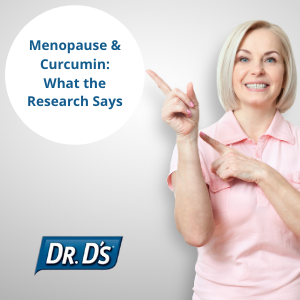
Menopause and Curcumin: What the Research Says
Share
Menopause occurs when a woman’s menstrual cycle has ceased for 12 consecutive months. It is a transition process, and usually begins between 45-55 years of age. Symptoms can begin as early as four years before their final cycle (a stage referred to as perimenopause) and can last until about four years after it (a stage called postmenopause).
Menopause occurs because the body slows down the production of two important hormones produced by the ovaries: estrogen and progesterone. Estrogen controls the menstrual cycle and is important in childbearing. It also plays a role in protecting bone health and keeps cholesterol under somewhat of a control. Progesterone is especially important in the early stages of pregnancy as it keeps the uterine lining optimal for implantation of the fertilized egg. It also plays an important role in regulation of the menstrual cycle.
It would only make sense that as these hormones start to decline in production, many things start to change in the female body. During the process, the body’s metabolism changes as well, meaning that it begins to use energy differently. As a consequence, fat cells change and women can experience weight gain more easily. The decline in estrogen can also cause bones to become less dense and therefore can cause an increase in fracture risk.
Menopause can also be induced by a hysterectomy or surgical removal of the ovaries and with the abrupt stop in hormone production, symptoms occur immediately.
Common symptoms of menopause include:
- Hot flashes/night sweats
- Weight gain
- Sleep difficulties
- Mood changes
There is some good news. Research suggests that curcumin, the most powerful medicinal property in turmeric, can help women who are experiencing some of the unpleasant effects that come with the hormonal shift during menopause. The following is a brief synopsis of what the literature is saying on the topic.
Curcumin and Hot Flashes/Night Sweats:
In a randomized controlled trial (a high-quality study), 93 post-menopausal women were studied. The first treatment group received oral capsules of curcumin (500 mg), the second treatment group received oral tablets of vitamin E (200 IU/day), and the third group (control) received placebo twice a day for eight weeks. The participants completed the hot flash checklist (which assessed their symptoms) one week before the study, and 4 weeks and 8 weeks after it. The first significant effect of curcumin on hot flashes was seen after just four weeks. The results showed that curcumin supplementation taken at that dosage and frequency significantly reduced hot flashes in post-menopausal women. (In case you’re wondering, the women in the Vitamin E treatment group also experienced a decrease in hot flashes, but not until the 8-week mark).
Curcumin and Metabolism (Weight Control):
Curcumin’s potential to improve lipid (fat) metabolism changes associated with hormone deficiency in menopause has already been shown in animal studies. Abdominal fat and total blood cholesterol were lower in rats without ovaries who received curcumin treatment compared to those who did not receive curcumin treatment. A systematic review of randomized controlled trials (which just means, a high-quality review of high-quality studies on human) concluded that curcumin intake among patients with metabolic syndrome and related disorders was correlated with a significant reduction in Body Mass Index (BMI) and weight (amongst other things). Metabolic syndrome is a group of conditions that increase your risk for things like diabetes, heart disease and stroke and includes high blood pressure, high cholesterol, high blood sugar levels and abdominal fat. Although these studies are not specific to weight gain due to menopause or hormonal changes, the positive changes that curcumin played in those individuals who struggle with weight is significant enough to hypothesize that it would give promise to any individual experiencing challenges with their weight.
Curcumin, Sleep and Mood Changes
Serotonin and dopamine play a role in sleep regulation and are considered “happy hormones”. Unfortunately, their production is also decreased as estrogen is deprived during menopause, so sleep difficulties and mood changes are 2 symptoms of menopause which seem to be related.
There have been a few animal studies looking into the effect curcumin has on sleep, for example, in one study researchers discovered that curcumin protected 72-hour sleep-deprived mice from the symptoms of sleep deprivation. A randomized controlled trial in humans found turmeric to be an effective and safe treatment of Major Depressive Disorder in those without suicidal ideation or other psychotic disorders. Again, although these study subjects did not experience hormonal-induced changes, one can hypothesize that the positive effects on mood via curcumin supplementation will also be found in those suffering mood changes due to hormonal shifts.
Overall, more research is needed to confirm the effects on turmeric and menopausal symptoms, but preliminary data definitely suggests its benefits.